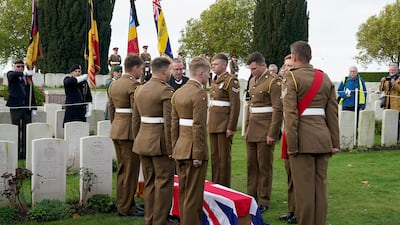A British soldier who died during the First World War has finally been laid to rest, more than 100 years after his death.
Lance Cpl Robert Cook received full military honours including a gun salute at a ceremony in Belgium on Wednesday after his identify was confirmed by experts known as the War Detectives.
The decorated soldier died aged 38 on May 2, 1915, two days after arriving near Ypres on the Western Front.
Born in Bishop Wilton in the East Riding of Yorkshire, Cook was one of seven children and served with the 2nd Battalion of the Essex Regiment.
He was buried at the Commonwealth War Graves Commission’s New Irish Farm Cemetery near Ypres after being identified by the Ministry of Defence’s Joint Casualty and Compassionate Centre.
Cook's great-nephew and great-niece attended the service to pay their respects, laying wreaths beside his white headstone.
Also present were members of C Essex Company of 1st Battalion the Royal Anglian Regiment, which is the modern equivalent of his regiment.
Draped in a flag, his coffin was carried to its final resting place by soldiers in full military dress.
“Today we accord Lance Cpl Cook the dignity and respect that he is due," said the Rev Paul Whitehead, who was conducting the service.
“I was struck that Lance Cpl Cook died only two days after arriving on the front line. Life expectancy was very short for a soldier on the Western Front.
“And like the 23 other soldiers whose remains were found with Lance Cpl Cook, many are known only to God.
“So in some ways, when a soldier is identified their name represents many others who fought and died with them; those who we may never know, but who knew each other’s names as they stood side by side in the trenches.
“So this is an important day for many reasons. Most importantly for the family of Lance Cpl Cook to finally be able to lay to rest his remains side by side with his colleagues. But also to celebrate his memory.”
Mr Whitehead, chaplain to 3rd Battalion of the Royal Anglian Regiment, spoke of the privilege to be at the ceremony and remember the sacrifice made by Cook and many others.
Cook’s surviving great-nephew, Arthur Cook, was presented with the folded flag.
After the coffin was lowered into the ground, volleys of shots rang out as six soldiers honoured him with a salute.
As the service drew to a close, the famous line from Laurence Binyon’s poem For the Fallen – “We will remember them” – was read and echoed by military and civilian guests.
After the service, Mr Cook said he had been surprised to be contacted by a team from the Ministry of Defence requesting a DNA sample.
“I can’t put it into words, it’s just amazing," he told PA. "I never anticipated anything of this nature. To think that 105 years further on and they still put this effort into a burial is unbelievable, it’s amazing.”
He praised the “forensic” work of the ministry team and the Essex Regiment Museum in identifying his great-uncle.
Mr Cook, 73, who lives in Orkney in Scotland, pledged to pass down the knowledge through his family.


